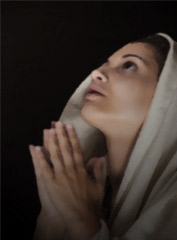The last few times we hear about Mary intrigue me. So much of a conversation involves the tone of what is said and the body language used when it is said. So I would love to have been there when the following dialogue took place:
As Jesus was saying these things, a woman in the crowd called out, "Blessed is the mother who gave you birth and nursed you."
He replied, "Blessed rather are those who hear the word of God and obey it" (Luke 11:27-28 NIV).
- What was Jesus' expression when he said these words?
- Did he say them softly?
- Was there a touch of melancholy in his voice?
- Did he say these words with a bit of hesitation for fear of hurting his mother?
- Did he speak them sharply to correct and re-direct the attention of the woman to the real issue she faced?
Mary is called "highly favored" by the angel (Luke 1:28) and "blessed" by Elizabeth (Luke 1:42). And the woman in the crowd is simply voicing what many must have thought over the centuries in anticipation of the Messiah: "To be the mother of the Lord's Messiah, our Savior and Deliverer, would be a great blessing, indeed!"
However, Jesus didn't let the focus rest upon Mary, but instead points the focus to obedience of the will of God and the blessing there for all of us! This is not a rebuke of the woman who said these words of admiration for Mary. It is not a rebuke of Mary as God's specially chosen one to be the mother of the Messiah. However, it is a reminder that the greatest blessing we received from Mary is that she always points us to Jesus! The focus of God's story is not her, but her on her son and her Savior, who happens to be our Lord.
Nowhere is this more powerfully emphasized than in our last direct glimpse* of Mary in the New Testament. Jesus has been crucified and raised from the dead. Before Jesus ascended back to the Father, he directed his followers to stay in Jerusalem and wait for power from on high, the gift the Father had promised them, the Holy Spirit (Acts1:1-4). So the apostles and closest followers of Jesus went back to Jerusalem and gathered in an upper room to pray. Luke describes the situation with these words:
They all joined together constantly in prayer, along with the women and Mary the mother of Jesus, and with his brothers (Acts 1:14).
In this final glimpse of Mary, we see her gathered with the other disciples in prayer, along with Jesus' brothers. They are not held up as uniquely special or important in this group. In fact, they are mentioned quite simply. We know that Jesus' brothers had not believed in him during his ministry, but apparently after his resurrection, they became his followers and joined Mary in doing what Jesus had commanded. Jesus was no longer primarily her son: he was now her Messiah. He was no longer their brother; he was their Lord!
Mary had now completed the glorious, and yet sometimes torturous, journey from mother to disciple:
- We see her first with the angel's appearance and prediction of Jesus' birth (Luke 1:26-38).
- Then we go with her to her visit to Elizabeth (Luke 1:39-55).
- Then we share in the birth of Jesus and visit at the manger of the shepherds (Luke 2:1-20).
- Several days later, Mary visits the Temple with Jesus, and we meet Simeon (Luke 2:21-35) and Anna (Luke 2:36-38).
- Later, the whole family contingent journeys to the Temple at age twelve (Luke 2:41-52).
- We join Mary and Jesus at a wedding in Cana of Galilee where Mary appears to nudge Jesus to begin his ministry (John 2:1-12).
- We see Mary's confusion over Jesus ministry when she and Jesus' brothers thought he had lost his mind (Mark 3:20-21).
- Jesus then addresses the issue of his true family (Mark 3:31-35) and we learn later that his brothers taunted him in disbelief (John 7:1-9).
- Later in Jesus' ministry, a woman in the crowd pronounces a blessing upon Mary (Luke 11:27-28).
- And at the poignant and awful moments at the cross, we see Mary and the beloved disciple (John 19:25-27).
- Finally, we see Mary one last time in the early moments of obedient discipleship waiting for the coming of the Holy Spirit in response to Jesus' command (Acts 1:12-14).
All along this journey we are invited to share in the wonder of God made flesh in Jesus. We see this wonder through the eyes and actions of Mary. We are amazed because Mary always leads us to Jesus — the real Jesus. And now as we gaze through this last window, we learn the greatest wonder of all: if we will join Mary in following Jesus, we can be part of Jesus' forever family, too!
* While this is the last specific mention of Mary, Mary's influence is felt and seen when you compare the magnificat and much of the teaching of Jesus, and later, Jesus' brother James — as mentioned in an earlier message in this series, see http://hlt.me/iWOdzE. In addition, Mary quite possibly furnishes the historical information on much of Luke chapters 1 and 2 as well as John chapter 2 and some other glimpses of Jesus in the gospels as treasures all these events in her heart (Luke 2:19 and Luke 2:51).










Reader Comments
Archived Facebook Comments